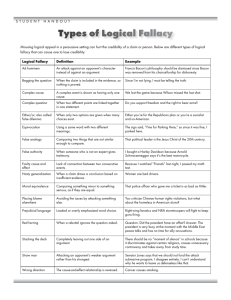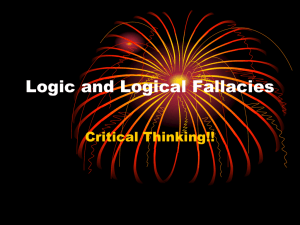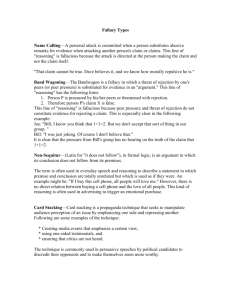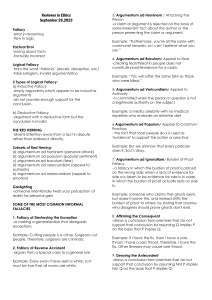Powerpoint Slides - Gospel of Grace Fellowship
advertisement
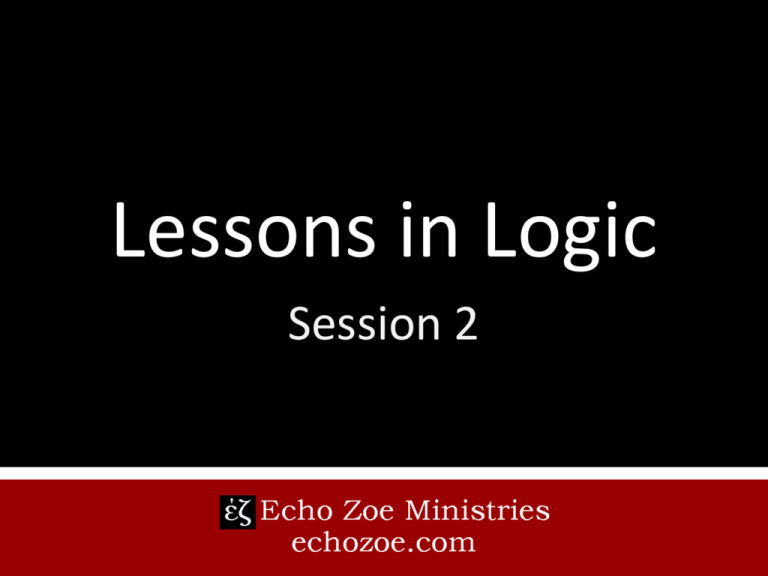
Lessons in Logic Session 2 Section 1B ASSOCIATION FALLACIES Guilt by Association • Creation of a fallacious link between one person, group, or idea and another in order to discredit it. • An effective political tactic. – McCarthyism – Disagreeing with President Obama is tied to racism, tying those with political differences to those who have an irrational hatred on the basis of race Guilt by Association • Guilt by Association in Theology: – Amillennialism is wrong because it’s the eschatology of Roman Catholicism – The Pharisees dismissed Jesus because he ate with sinners. Transfer • The attempt to transfer your positive feelings about one thing to another, unrelated thing. • Very common in advertising. Examples of Transfer Failed example of Transfer Reductio ad Hitlerum/ Argumentum ad Hitlerum • The “Nazi Card” • Attempts to discredit a premise because it can be associated with Adolf Hitler and/or the Nazi Party. • Example: Hitler was known to love animals, and had several dogs. To suggest that owning dogs makes one a Nazi would be to commit “Argumentum ad Hitlerum.” • The “Pharisee Card” is a virtually identical fallacy. Section 2 FALSE ASSUMPTIONS Circular Reasoning • The original premise is the final conclusion • Example: Rock layers are dated by the fossils they contain, and the fossils are dated by the rock layers they’re found in. Begging the Question • The original premise is assumed in the final conclusion • Similar to Circular Reasoning – Some consider them the same fallacy – Distinction is assumption vs. assertion • Examples from Creation/Evolution Debate* – “The Bible cannot be true because it contains miracles, and miracles violate the laws of nature.” – “It makes no sense to deny evolution, it is a well-established fact of nature.” – “The Bible must be the Word of God because it says it is, and what it says must be true because God cannot lie.” – “We know evolution is true because we are here.” – *Answers in Genesis article, see: ezmin.us/begtheq Equivocation • Juxtaposing two or more uses of a word or symbol with different meanings, implying that they have the same meaning. • Leveraging ambiguity in order to mislead. Equivocation • Example (from Wikipedia): – Margarine is better than nothing. – Nothing is better than butter. – Therefore, Margarine is better than butter. • Examples from theology: – Word of Faith movement equivocates over the word “Faith”, which they describe as a force, rather than trust. – “There’s power in the blood…” • Used often by the cults – Insist that terms are defined Loaded Question • A question that presumes the conclusion. Puts the person being asked in a tricky situation, whereby no matter how they answer, they appear to forfeit ground in the debate. • Commonly used by “hard-hitting” television talking heads such as Bill O’Reilly and Piers Morgan to convey the appearance of superior intellect & debating skills. • Examples: – Have you stopped beating your wife? – “Where does the US Constitution say that same-sex couples can’t get married?*” • * Piers Morgan asked this of Ryan Anderson of the Heritage Foundation in a show discussing this topic on March 26, 2013 Composition & Division • Composition falsely assumes that what is true of the parts is also true of the whole. – Example: Every track of a CD is 10 minutes long, therefore the entire CD is 10 minutes long1. • Division falsely assumes that what is true of the whole is also true of the parts. – Examples: • A particular brick wall is fragile, therefore the bricks that make up the wall are fragile1. • 1Source: example from this fallacy are from the “Fallacy Friday” podcast available at apologetics315.com False Dichotomy/False Dilemma • Assumes only two available options, when there are actually more • Often pits one extreme against the other – Anarchy vs. Totalitarianism – Republican vs. Democrat – Pelagianism vs. Hyper-Calvinism • Example: John 9:2-3 says “And His disciples asked Him, ‘Rabbi, who sinned, this man or his parents, that he would be born blind?’ Jesus answered, ‘It was neither that this man sinned, nor his parents; but it was so that the works of God might be displayed in him.” • Opposite of “Middle Ground” Fallacy Middle Ground • Argument to moderation • Proposes more than two options when only two are available. – Wife wants a baby, husband does not; a mediator proposes having half a baby. • Examples: – The claim that all religions have grains of truth and all paths lead to God. – The Hegelian Dialectic; Thesis, Antithesis, & Synthesis • Opposite of “False Dichotomy” Etymology Fallacy • Similar to Equivocation • Meaning of words has changed, but assumed to still have the same meaning • Examples from the US Constitution: – Militia (2nd Amendment): • Late 18th Century: All able-bodied male citizens • Early 21st Century: The National Guard – Regulate (Commerce Clause): • Late 18th Century: To make regular (uniform) • Early 21st Century: To enact restrictions Argument from Fallacy • AKA: The Fallacy Fallacy • Assumes that because an argument is fallacious, the conclusion must be false. • People often come to the correct conclusion, but get there through bad reasoning. • Faulty reasoning does not invalidate the correct conclusion. • Example: All horses are animals. Mr. Ed was an animal. Therefore, Mr. Ed was a horse. Next Week: STATISTICAL FALLACIES & PROPAGANDA
